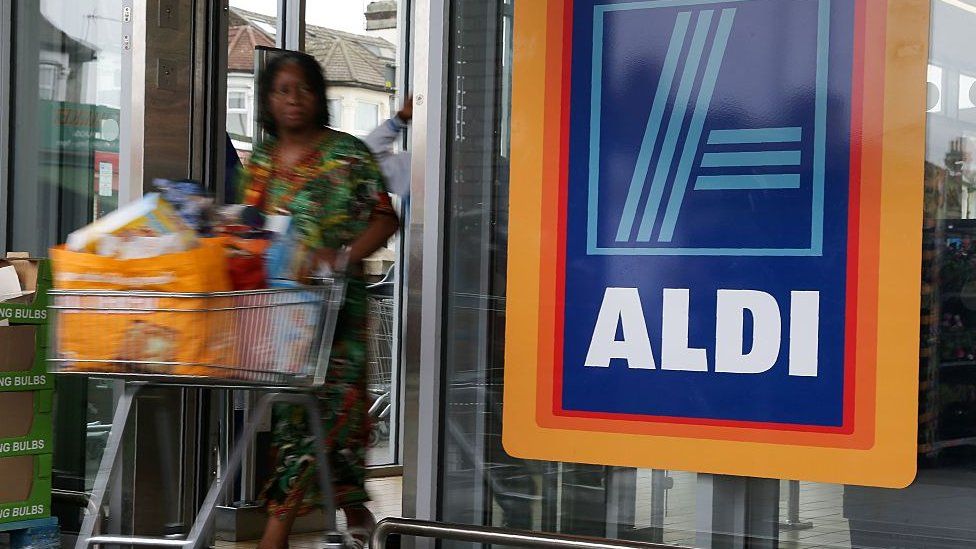ARTICLE AD BOX
 Image source, Getty Images
Image source, Getty Images
By Emma Simpson
Business correspondent, BBC News
The cost-of-living crisis has changed shopping habits for good, according to the boss of Aldi in the UK and Ireland.
Giles Hurley says shoppers are buying more own label products than ever before and he expects this to stick.
Cheaper supermarket own label ranges are enjoying a boom as shoppers try to save money.
Aldi overtook Morrisons last year to become the UK's fourth-biggest supermarket. Alongside rival Lidl it has been the fastest growing this year.
Products that are sold under a supermarket's own name now make up more than half of everything shoppers buy, by value.
"If you look in volume terms that figure is much bigger and at the moment own label products are growing at twice the rate of branded goods," says Mr Hurley. "Why would [shoppers] go back?"
The vast majority of the products Aldi and Lidl sell are own label.
He says Aldi has added nearly a million more customers in the past 12 months and two thirds of UK households are now shopping with the chain.
Aldi has now released its financial results for the year to the end of December 2022.
UK sales were up by nearly £2bn to £15.5bn. Operating profit also increased to £178.7m, almost triple the amount it made the year before.
Other big supermarkets have reported a drop in profits. Lidl made an annual loss.
Aldi said the increase was due to an exceptional prior year when its profit margin fell to an 11 year low of 0.4% after significant Covid related costs.
"It's really important to stress that margins in retail are extremely tight and we are no exception," said Mr Hurley.
Its profit margin, the measure of how much money a company makes on its products after costs and expenses, was 1.2% last year.
"That's just over a penny in every pound spent in an Aldi store," Mr Hurley points out.
Image source, Tom Espiner
Image caption,Giles Hurley says Aldi profit margins and 'extremely tight'
Aldi has now set a long-term target of having 1500 UK stores, up from 1200 previously.
It opened its 1000th store in Woking earlier this month and plans to invest a further £1.4bn in the UK over the next two years.
Finding the right sites, particularly in the southeast of England and London, is far from easy, though.
And will shoppers stay loyal to Aldi when this cost-of-living crisis is over?
Some affluent shoppers may well decide to "trade up" again.
Retail expert Catherine Shuttleworth says brands are the life blood of innovation in the food and drinks sector but thinks they're going to have to work hard through marketing campaigns to persuade shoppers that their products are worth paying more for.
"The supermarkets' loyalty card pricing schemes will encourage brand participation and brands should be very eager to showcase their products to millions of shoppers every week in the battle to get us to trade back into brands."
For instance, earlier this month Sainsbury's offered 50% off all Heinz branded products with a Nectar card.
But Ms Shuttleworth believes our "thrifty approach" during the cost-of-living crisis isn't going to go away anytime soon.
"Discount shopping is here to stay, so much so that shoppers don't even call Aldi and Lidl discounters any longer - they are their supermarkets of choice."
On a visit to an Aldi store on the outskirts of Leicester where they are testing new ideas, including chiller doors on most of their fresh products to save energy, Giles Hurley dismissed suggestions from some in the industry that Aldi had now hit "peak disruption"
"There is a huge demand for our offer here in the UK... I frequently get customers writing to me asking for an Aldi store to come to their town or community."
"We have huge ambitions."
His mantra is that Aldi "will never be beaten on price."
But bigger rivals aren't allowing Aldi, nor Lidl, to have it all their own way.
Competition in the supermarket aisles is as intense as ever with Tesco and Sainsbury's running Aldi price matching schemes.
Food price inflation is now easing but remains stubbornly high, rising 13.6% in the year to August, according to the Office for National Statistics.
Supermarkets have been cutting prices on a wide range of products over the last few months.
At Aldi, Mr Hurley said customers would continue to see price reductions in the medium term but the future was far more difficult to judge given how volatile the last two years had been, with commodity costs, energy and fuel prices.
"That volatility is still continuing."
Ms Shuttleworth says the key for Aldi will to be to "stick to their knitting" and maintain a price differential to their rivals. This which will mean having to accept lower profit margins and driving as much volume as possible.
It says it can afford to take a long-term view as a privately-owned business.

 1 year ago
52
1 year ago
52








 English (US) ·
English (US) ·